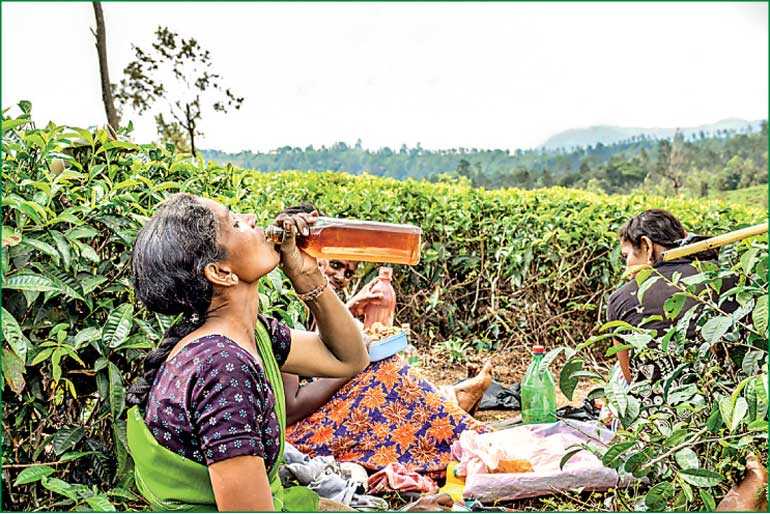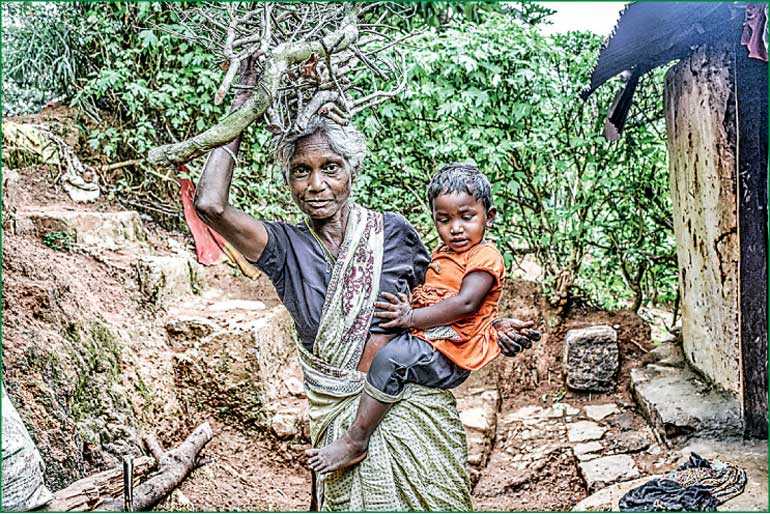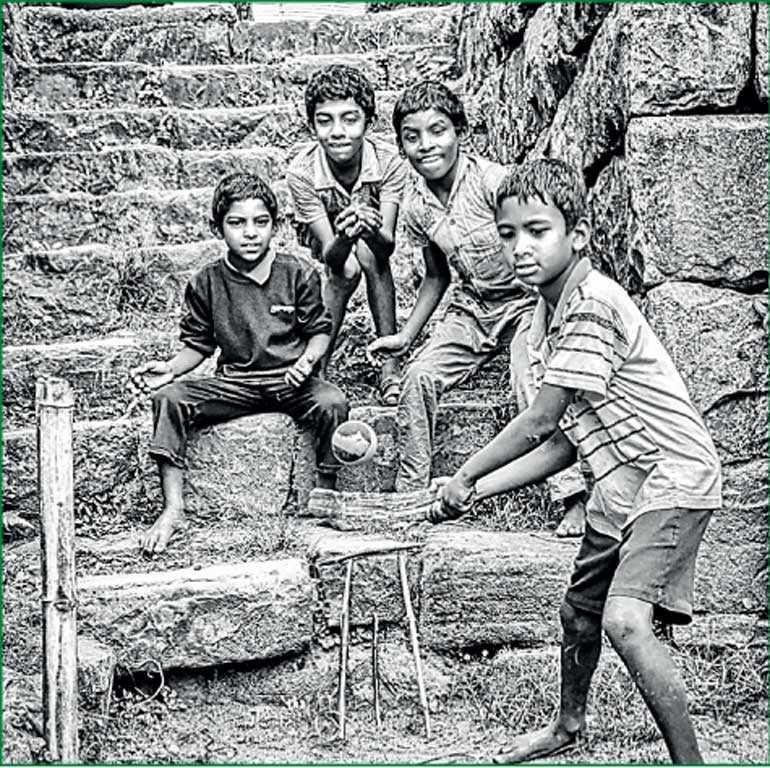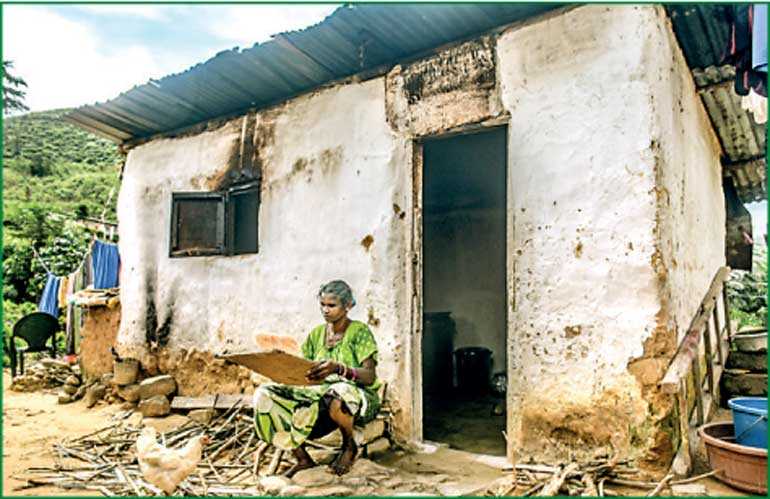Saturday Feb 21, 2026
Saturday Feb 21, 2026
Saturday, 3 October 2020 00:00 - - {{hitsCtrl.values.hits}}

‘Brief Respite’ by A. Ajithkumar from the Uva Highlands 
‘Laboring On’ by G. Kalayvani from Uva Highlands
As yet unheard voices from Sri Lanka’s plantation sector
By Chandrika Gadiewasam and Nadeesha Paulis
Over decades, the name of Ceylon reached fame worldwide in reference to the Indian Ocean island’s beauty, serenity and tea. Tea contributes to the backbone of this island nation’s economy and in turn the foundation of the tea industry is its labour force made up of Indian origin Tamils whose ancestors were virtually slaves brought to Sri Lanka by the British centuries ago. This is a community for whom time has stood still, in terms of standards of life, development and human rights and who continue to be politically, economically and socially marginalised even in the current day and age.
‘Thé Kahata’ is a photography exhibition with a difference. This exhibition features strikingly professional photographs from the estates brought to us not by established city artists, but by youth of the plantation sector themselves. The exhibition gives us at its rawest, a glimpse into how communities themselves experience life among the illusionary beauty, the raw challenge and the deep pathos of life in the plantation sector of Sri Lanka. Here we see how the upcountry Tamil community who pluck the tea, tend to the plantations and uphold the production process, benefit the least from the industry that fuels the economy of the entire country.
By numerous development indicators, this community is far behind compared to the rest of Sri Lanka. Bereft of some of the basic civil rights that other Sri Lankans have, and paid the lowest incomes in the country, members of these communities are often unable to even own the pitiable cramped ‘line rooms’ they have lived in for generations. And as with most marginalised peoples, women of the plantation sector are the most exploited both in terms of income and rights.
The struggle continues for the minimum daily wage of Rs. 1,000 (around GBP 4) and workers continue to be paid only a few dollars a day for back breaking labour of picking and carrying 16-18 kg of tea over one day, fully exposed to the elements, with women always being paid less than men. Discrimination faced by estate worker communities includes inequality in access to ownership of land and property, lack of basic infrastructural facilities such as a postal address for their homes, and prolonged statelessness with citizenship only having been granted to them as recently as 2003.
Meaningful citizenship continues to be illusive in an environment where the plantation management has taken over many of the functions of the state such as sanitation, road access and rudimentary healthcare, to such an extent that even personal mail1 is delivered to central offices and held there often without real accountability. Estate power dynamics are often such that even access to narratives from within the estates requires permission and the agreement of the estate management as though their human resources are in held in modern day slavery, as if ‘owned’ by their employers.
‘Thé Kahata’ features photographs taken by 40 young boys and girls of four selected tea estates of the up-country region namely Holyrood and Logy estates representing the Nuwara Eliya District, and Etampitiya and Uva Highland estates representing the Badulla District. A program by the Uva Shakti Foundation of Badulla conducted workshops training the youth with the technical knowhow on photography and creative photovoice concepts to effectively drive the communication of their narratives.
The participating youth began through a process of social consciousness building, to better understand their social and political background with a vision towards social transformation. The process was carried through a full year in the midst of serious challenges due to the Easter attacks in Sri Lanka and then more recently through the COVID-19 pandemic. The enthusiastic youth (with ample support from their parents) were determined to capture and present visuals of their communities through their own lenses, by themselves.
The final aim of the exercise was to initiate a discourse engaging the upcountry Tamil community in better social and economic development of their position in society; a subsidiary aim is empowering the youngsters with a professional photography qualification which would serve them well in future, both within and outside the estates, should they decide to follow such a career.

Children of the Tea Kethishwaran

‘Line Room Only’ by C. Kogilapriya
The ‘Thé Kahata’ Exhibition in photojournalism from the estate sector was held at the Lionel Wendt from 26-27 September. The exhibition and the overall project which sought to empower estate sector youth and create an increased space for discourse on plantation community issues through photovoice communications, was facilitated by the Centre for Policy Alternatives in partnership with Strengthening Reconciliation Processes in Sri Lanka (SRP), a program co-financed by the European Union and German Federal Foreign Office.
The program owes its success also to the Uva Shakti Foundation of Badulla, together with the active involvement of the upcountry Tamil community and the collaboration of the Holyrood, Logy, Etampitiya and Uva Highlands Estates who permitted the workshops to be held in their estates, and also supported the program throughout, up to the exhibitions. Professional training in photography was provided by well-known photographers Ajith Seneviratne and Nadishka Ranasinghe. For enquiries please call 0113030463 or email [email protected].
Footnote
1https://www.cpalanka.org/vilaasama-safeguarding-civil-rights-of-plantation-sector-workers/